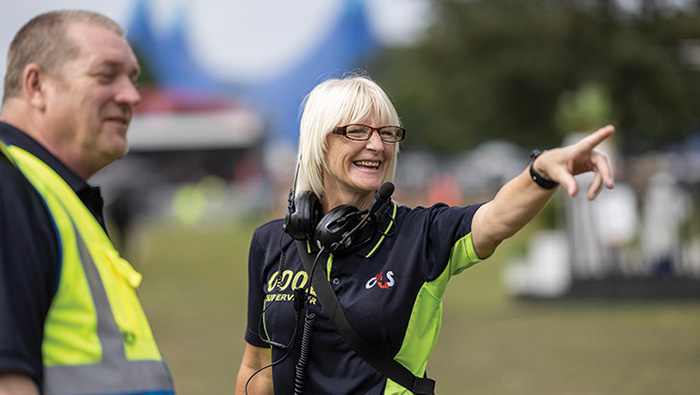The Importance Of Recruiting More Women Into Security

If you were to close your eyes and describe a security officer, would they be a man?
With only around 11% of frontline security officers in the UK being women, it’s likely that most people would think of a man. However, G4S anticipates that, within the next few years, this preconception will become outdated. The company is driving positive action to make the security industry a more diverse and inclusive profession that represents the people it aims to protect.
Over the next few years the security industry will be one that places great value on communication, interpersonal skills, diversity and utilises cutting‑edge technology. The security officer of the future will be more emotionally intelligent and will rely on people skills rather than physical attributes of strength. Even the ability to speak additional languages will become more important in our multicultural society.
According to the first ever World Security Report, 67% of Chief Security Officers (CSOs) in the UK say emotional intelligence will be extremely important for frontline officers. In fact, the research found that, for nine out of ten respondents, people skills in frontline security professionals are more important than physical attributes of strength.
With the growing importance of a more diverse security workforce and with women offering the skills needed, increasing the number of women in security is critical.
At G4S UK, a Diversity, Equity, and Inclusion (DE&I) Council, which includes representation from different groups from across the business, is providing focus, direction and taking action.

“The fact is that women can have a fulfilling career in security that allows them to leverage their skills. We need to break down the stereotypes. As our recent World Security Report showed, the softer skills are often actually more effective, and, in many markets, increasing numbers of corporate security leaders are women.”
In the UK & Ireland, G4S sets its recruitment targets to increase the number of women hired, compared to previous years.
Tim Kendall, Managing Director of G4S Secure Solutions UK says: “We are committed to putting practical actions in place to drive positive change. We have a key strategic objective to improve DE&I across our business and we are supporting industry change by collaborating with the DE&I Forum endorsed by the SIA and Forum members for the Private Security Industry.”
The Changing Face Of Security

In many cases, the security officer is the first and last visitor interaction, so their customer service and engagement are a key part of the guest experience.
Claire Daniel, Operations Director at Warwickshire County Cricket Club (WCCC) works with G4S and says: “In the security role it isn’t about being strong, there’s so much more around customer service and being able to ask inquisitive questions, but in a way that is welcoming. Security and customer service go hand in hand, it’s a role that requires empathy, and I think we need more women in it.”
A diverse security workforce is key to making communities feel safe and women offer so many of the skills that effective security demands. Furthermore, there are specific roles, such as searching and screening, where it is a requirement for women to perform the role.
Claire Daniel continues: “At WCCC, we are working to make sure that cricket is accessible to all. We are now seeing many more women and children come to our matches and, at a recent match, 44% of the spectators were women. On a practical level this means that we also need more women in the security team, or female spectators will have a poorer experience because they have to wait to be searched.”
So Why Aren’t Women Joining The Industry?

Jane Fairweather is the G4S Operations Director at Hinkley Point C nuclear power station and worked in banking for 28 years before starting at G4S as a frontline event steward. She says “My mum was horrified when I told her I was going to work in security, but I loved working at events and progressed in my career with G4S.
“It took a long time to get over to her what happens in security, and I think that’s where the problem lies: it’s the perception.”
Jane adds that language used in the industry must not exclude women: “The term ‘manned guarding’ is outdated, risks excluding women and is no longer appropriate to use. Moving forwards, I hope that there will be further development of the names used to describe the breadth of security roles carried out by a diverse workforce.”
Laura Njoku, G4S Account Manager agrees: “I believe that job titles should reflect more accurately what the roles involve. This will attract people who may not have previously considered a career in security. For example, a front of house security role could be called Concierge Manager rather than Security Officer.”
What Is G4S Doing?
In the UK and Ireland, G4S is working hard to retain, develop, and learn from the existing women who work across the business. Underpinning this objective is G4S’ Women’s Initiative Network, which provides information and assistance to women in the business.
Heike Butler, G4S Head of Social Value and Sustainability says: “We’ve created the G4S Women's Initiative Network to provide support to female security officers and help build equality and equity. As well as being a useful source of information, it is about trying to ensure that women are comfortable in the workplace and that their specific needs have not been inadvertently overlooked. We want women to feel confident and positive in their roles and have been undertaking site visits to ensure that we understand their work environments and ensure that they know that they are supported.”
G4S is working with clients, such as Yusen Logistics UK, who are committed to providing equal opportunities, achieving full inclusivity and eliminating all forms of discrimination. Yusen Logistics believes that providing improved development opportunities for women will help to redress the gender imbalance across the logistics industry. The company runs internal campaigns raising awareness of gender‑related topics and challenges faced by female colleagues, and has recently improved its maternity and paternity pay policy. Along with hybrid working options for many roles, Yusen Logistics’ Flexible Workforce programme offers a solution for both men and women who need work flexibility and women now also account for 58% of the company’s apprenticeship programme.
Poppy Lofting, Risk & Technical Apprentice at Yusen Logistics says: “Female role models within the security industry hold the key to dispelling some industry myths. Yusen Logistics is providing me with opportunities to turn theory into practice, by acquiring hands‑on experience through direct exposure to real‑world scenarios. I’m just at the beginning of my career journey, but you just never know, perhaps one day I might inspire more women to start a career in security.”
While there are some instances where flexibility is difficult, there are already many roles that offer office hours, split shifts, or other shifts that may suit candidates. Security in certain sectors, such as retail, can offer flexible options. G4S is working closely with customers to understand and provide that flexibility to help attract a more diverse workforce.
Claire Daniel believes that candidates wanting more flexible or shorter shifts shouldn’t be seen as a barrier but as an opportunity for employers: “At Edgbaston for example, we want to be ‘Edgbaston for everyone’. To be truly for everyone that means that we will have to adapt some of the styles of working. To reduce the length of shifts, if we employed ten women and swapped with ten different women after 6 hours, who are all trained the same, what’s the problem?.”

Recruitment is also a focus. Head of Resourcing, Fran Watts explains more: “Recruitment of women is a priority for G4S, and we are looking at how we can target women more effectively and communicate that security can offer them a positive and rewarding career. In addition, we ensure that our recruitment advertising does not include words or imagery that makes it appear biased towards one gender and we have created videos and campaigns that make it clear that security represents a viable career choice for women.
“We recognise that the recruitment process can take longer than many other sectors, so G4S also runs women‑only video calls where potential new recruits have the opportunity to talk to women already working at G4S, to find out about their experience and ask questions.”
G4S is also running campaigns that celebrate the contribution of the women who work across G4S. A series of women have been interviewed, talking about their perception of security and their experiences with content shared across social media. The company is also investing in reward schemes and industry award submissions that provide recognition of outstanding achievements.
The Future And The Benefits

Fiona Walters, G4S CEO UK and Ireland concludes: “I am passionate about trying to encourage more women into the security industry. I have benefited from being able to progress through the business, and I have a responsibility to ensure that other women have that opportunity as well.”
For information on G4S careers https://www.g4s.com/en‑gb/careers
Click the article to enlarge it.












































